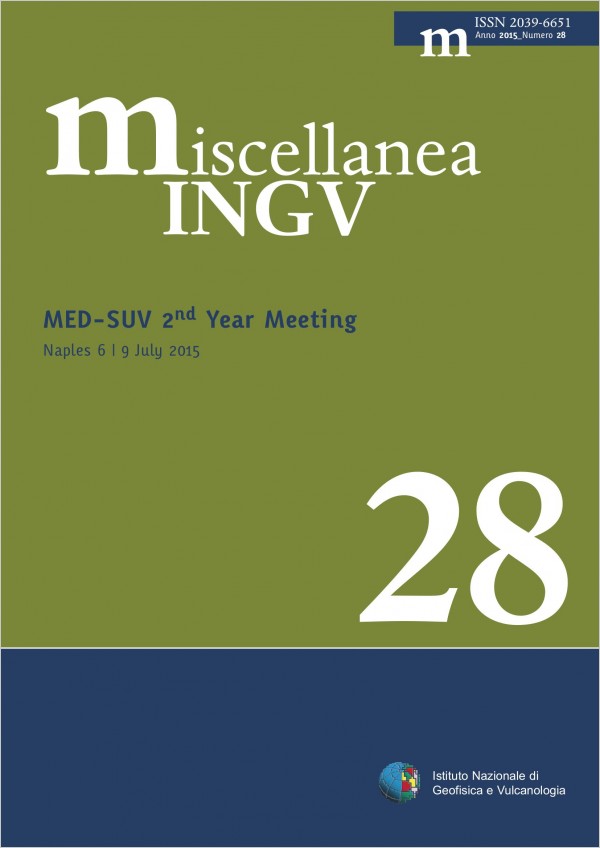The MEDiterranean Supersite Volcanoes (MED-SUV) is a FP7 project born under the European Community call “ENV.2012.6.4-2 “Long-term monitoring experiments in geologically active regions of Europe prone to natural hazards: the Supersite concept” - FP7-ENV-2012-two-stage – of 20 July 2011. MED-SUV, which started on 1 June 2013, is just on its third and last year of activities. The project has focused on pushing forward the concept of the Geo-Supersites promoted by GEO-GEOSS, by carrying out research and technological development at two of the main hazardous European volcanic areas – Mt. Etna and Campi Flegrei/Vesuvius. MED-SUV is structured in 8 operational Work Packages (WPs) among which WP1 deals with the project coordination and management and WP8 with the dissemination of the project outcomes. The other 6 WPs are involved in RTD activities, and in particular WP2 and WP3 are dedicated to the design and implementation of new instrumentation and of the project e-infrastructure, respectively. WP4 and WP5 are where the volcanic research activities are carried out at Campi Flegrei/Vesuvius and Mt. Etna, respectively. WP6 is fully dedicated to volcano hazard modelling. WP7 represents the framework in which the novel achievements are validated by tests carried out at two other European volcanic systems, i.e. Piton de la Fournaise and Azores. Throughout the second year, many of the activities foreseen in the project work plan were carried out including the implementation of the architecture of an e-infrastructure for data access, development of new tools and instrumentation for volcano monitoring, research experiments for better understanding of the volcanic feeding systems and eruptive activity, data analysis and modelling for volcanic hazard assessment, and dissemination activities to promote the project results among the scientific community and to foster people awareness of volcanic phenomena. At the present, the MED-SUV consortium has already moved on with the activities scheduled for the third year. Indeed, aside the finalization of the activities started in the previous two years, the main challenge of the community consists on the formulation of the best strategy for ensuring the broadest dissemination of the project outcomes. This aim includes MED-SUV data sharing and data protection by well-established data policy principles and intellectual property definition, as well as the design of a robust strategy for the longterm sustainability of results, such as the project e-infrastructure. In order to discuss, share, and plan the results achieved and the future perspectives, the MED-SUV consortium is convening for its yearly appointment. Differently from the last July, this year the meeting is hosted in Naples, the town that more than the others, is associated with volcanic power and destruction. The Neapolitan volcanoes, indeed, signed the birth of Volcanology. In fact, from Capo Miseno (northern border of the Campi Flegrei caldera), Pliny the Younger described the 79 AD Mt. Vesuvius eruption, thus providing the first scientific report of a volcanic eruption, which is at the base of many studies of this volcano and of the plinian eruptions even in the current research. Project Leader Giuseppe Puglisi
Published: 2022-01-12

